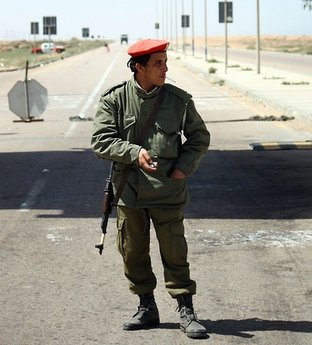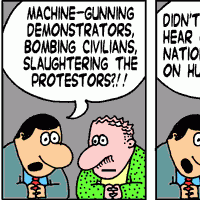![]()
Mon, March 28, 2011 | The Rubin Report | By Barry Rubin

A Libyan soldier, member of a battalion commanded by Moamer Kadahfi's son Khamis, mans a check point some 50 kms from Sirte. Libyan rebels were stopped in their tracks on Monday as forces loyal to Moamer Kadhafi launched a fierce attack on their convoy, halting their push forward to Sirte for a second time in the day. (AFP/Imed Lamloum)
The Intervention in Libya: A Feel-Good Mirage
The Western intervention in Libya is the kind of thing that makes governments feel good and look good — provided they have a tame media unwilling to ask tough questions — but is of little or no strategic importance.
There are two good rationales for the operation: If Qadhafi survives he is likely to return to a high priority on international terrorism and subversion and if he won he probably would have murdered hundreds, even thousands of people. While Syria and the Hamas regime in the Gaza Strip are high-profile terrorism sponsors that U.S. policy accepts, next to them Qadhafi is the worst such figure and he is highly adventurous.
So a case can be made for intervention. Yet there are also points on the other side. Note that Secretary of Defense Robert Gates publicly contradicted the White House by saying that intervention in Libya isn’t a vital U.S. interest, again contradicting Clinton and the White House. Also note that the U.S. military commanders are unanimously opposed to taking on this additional mission with an ill-defined goal.
Consider also the following points:
1. The intervention has not brought the civil war one inch (or one millimeter if you prefer) closer to resolution.
2. The intervention has done virtually nothing to bring victory to the opposition and the defeat and departure of dictator Muammar Qadhafi.
3. The intervention has not brought us any nearer to understanding the nature of the Libyan opposition.
The idea that the Libyan rebels are mostly or all al-Qaida and Islamists is absurd and there’s no evidence for it. Certainly there are Islamists. And of course, the idea that they are mostly — or are mainly led by — moderate liberal democrats is equally absurd.
What are their motives?
Understandable hatred for a terrible, corrupt, repressive regime led by a madman, horrible even by Middle Eastern, Arab world standards.
Regional antagonisms against domination by western Libyans. This implies, however, that a lot of Libyans in the western part of the country support Qadhafi.
Tribal anger from the feeling that other tribes get the loot. By the same token, Qadhafi has a loyal base of support among the tribes who have received benefits from him.
And of course Islamist influences, too. There is no doubt that there are a few among the rebels with al-Qaida ties and more with Muslim Brotherhood links. But the question is whether these people are dominant in the movement, and the answer is “no.”
Tunisia is not Egypt is not Libya. In Tunisia, organized Islamists have a real but limited base, in part because of systematic repression in the past. In Egypt, they have a much larger base given the movement’s deep roots and also, ironically, because the Mubarak regime was much more tolerant of the Brotherhood operating than is understood in the West. Libya has more in common with Tunisia in this respect than it does with Egypt.
The problem, then, is not that the rebels are all Islamist radicals. The problem is:
— Nobody has bothered to investigate this issue in the U.S. government, an act of monumental irresponsibility especially before intervening militarily on their side.
— There is not even a glimmer of a strategy to help the least objectionable people and groups against those who might create a post-Qadhafi anti-American, radical Islamist regime.
— Islamists have an attractive ideology and are well-organized so they may well come out first in a post-Qadhafi regime.
— Islamists will also have a lot of international support and funding from the Muslim Brotherhood, Iran, etc.
Finally, the international leadership of the rebels are “respectable” former government officials. But, of course, they have no real control over what goes on inside the country. (Consider what happened in Iraq for example).
So the problem is not that the Libyan rebels are mostly revolutionary Islamists as a group but that a thoughtless, careless policy might end up installing revolutionary Islamists in power some day. Sort of like…Egypt.
4. The intervention has not in any way prevented Libyan civilians from being killed or wounded by rifles, machine-guns, artillery, or various other weapons. It has only prevented them from being killed by planes, helicopters, or — to a limited extent — tanks.
Can anyone challenge any of these assertions? No. They can only ignore or distort them.
So what has the intervention achieved in terms of Libya?
It has slowed, but not necessarily stopped Qadhafi’s victory. Thus, the war will go on longer. Perhaps the country will be split in two for a long period of time. Oil production will remain largely off-line. The U.S. government says, on one hand, that this operation is only for a limited time while simultaneously announcing it will continue throughout 2011. And 2012?
The intervention has also prevented Qadhafi from importing arms, though there is no proof that he needed to do so. Finally, it has prevented Libyan oppositionists from being killed by planes or helicopters.
Finally, it has unintentionally showed that the Western alliance is in tatters and that there is no substitute for American leadership.
By the way, it is pretty horrifying when the president of the United States says, as Obama did, “It is U.S. policy that Qadhafi needs to go.” Note the passive form. It says: it’s not U.S. policy to get rid of Qadhafi but he ought to leave to spare us the problem altogether. In other words, we aren’t going to resolve it so let Qadhafi do so for us by disappearing of his own accord.
The implication here is that he should just decide to move to southern France or that his own colleagues should get rid of him. (The latter idea worked in Egypt, but conditions were different there.) But this phrasing makes the United States an onlooker. It expresses a hope, not a strategy and not an operation to be implemented. Of course, Obama also justifies his policy on international consensus rather than U.S. national interests. And he also justifies it on the basis of a humanitarian defense of civilians, which is not the same as overthrowing governments.



 RSS
RSS










The Intervention in #Libya: A Feel-Good Mirage | #France #NATO #tcot http://j.mp/iiSdJQ
RT @CrethiPlethi: The Intervention in #Libya: A Feel-Good Mirage | #France #NATO #tcot http://j.mp/iiSdJQ